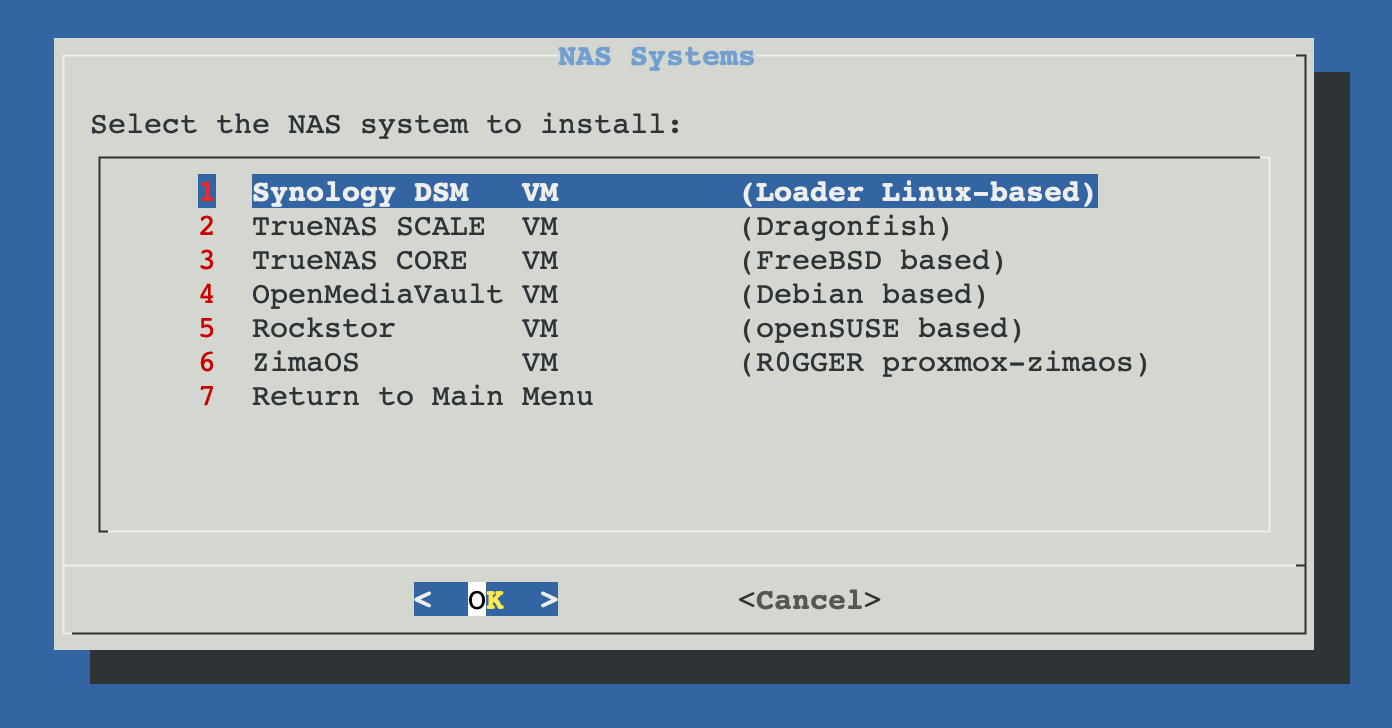System NAS Virtual Machines
ProxMenux provides automated scripts that create and configure virtual machines for various NAS systems on Proxmox VE. These scripts simplify the process by handling the necessary configurations and optimizations for each NAS platform.

Available NAS Systems
Select one of the NAS systems below to view detailed documentation on installation and configuration.
Synology DSM (DiskStation Manager) is a popular NAS operating system with a comprehensive set of features for home and business users.
Key Features:
- User-friendly web interface
- Extensive app ecosystem
- File sharing and synchronization
- Media streaming capabilities
Technical Details:
- Base OS: Linux (Custom)
- File Systems: Btrfs, ext4
- Virtualization: Yes (Docker)
- Hardware Requirements: Moderate
TrueNAS SCALE is a Linux-based version of TrueNAS that combines the simplicity of TrueNAS with the scalability of Linux, including support for containerization and hyperconvergence.
Key Features:
- Linux-based (Debian)
- Docker container support
- Kubernetes integration
- Scale-out clustering capabilities
Technical Details:
- Base OS: Debian Linux
- File System: ZFS
- Virtualization: Yes (KVM)
- Hardware Requirements: High
TrueNAS CORE (formerly FreeNAS) is a FreeBSD-based open-source NAS operating system that provides file and object storage with enterprise-grade reliability.
Key Features:
- FreeBSD-based
- ZFS file system
- Snapshots and replication
- Encryption
Technical Details:
- Base OS: FreeBSD
- File System: ZFS
- Virtualization: Yes (Jails)
- Hardware Requirements: Moderate to High
OpenMediaVault (OMV) is a Debian-based NAS solution with a lightweight web interface designed for small home offices and personal use.
Key Features:
- Modular plugin architecture
- Multiple filesystem support
- Docker support via plugins
- Low resource requirements
Technical Details:
- Base OS: Debian Linux
- File Systems: ext4, XFS, Btrfs
- Virtualization: Yes (via plugins)
- Hardware Requirements: Low
Rockstor is a Linux-based NAS solution built on CentOS with the BTRFS file system, offering advanced storage features with a user-friendly interface.
Key Features:
- BTRFS file system
- Web-based UI
- Docker-based app framework (Rock-ons)
- Snapshots and replication
Technical Details:
- Base OS: openSUSE based
- File System: Btrfs
- Virtualization: Yes (Docker)
- Hardware Requirements: Moderate
ZimaOS
ZimaOS is a lightweight, customizable NAS operating system designed for simplicity and performance, with a focus on media streaming and home automation.
Key Features:
- Low resource footprint
- Docker support
- Media streaming optimization
- Home automation integration
Technical Details:
- Base OS: ROGGER proxmox-zimaos
- File Systems: ext4, XFS
- Virtualization: Yes (Docker)
- Hardware Requirements: Low
About NAS Virtual Machines
Network Attached Storage (NAS) systems provide file-level data storage services to other devices on the network. Running NAS software in a virtual machine on Proxmox VE allows you to leverage the reliability and management features of Proxmox while providing flexible storage solutions.
ProxMenux simplifies the creation of NAS virtual machines by automating the configuration process, including network settings, storage allocation, and system optimization for each specific NAS platform.